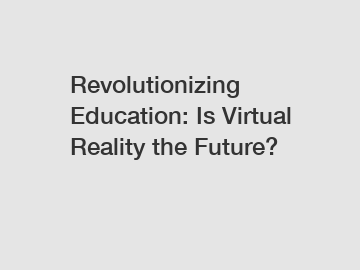Mar. 14, 2024
Hardware
As technology continues to rapidly advance, the ways in which we educate ourselves and others are also evolving. One of the most exciting developments in the field of education is the use of virtual reality (VR) technology. Virtual reality has the potential to revolutionize the way we learn by providing immersive, interactive, and engaging educational experiences unlike anything we have seen before.
Virtual reality is a computer-generated simulation of a three-dimensional environment that can be interacted with in a seemingly real or physical way by a person using special electronic equipment, such as a headset or gloves. This technology has the ability to transport students to different places, times, and scenarios that they might not otherwise have access to. With VR, students can explore the depths of the ocean, travel to outer space, or experience important historical events as if they were actually there.
One of the most significant benefits of virtual reality in education is its ability to increase student engagement and retention. Traditional methods of learning, such as lectures and textbooks, can often be dry and uninspiring, leading to disinterest and lack of retention. However, VR creates a dynamic and interactive learning environment that captivates students' attention and allows them to actively participate in their own education. Studies have shown that students who learn in a virtual reality environment retain information better and for longer periods of time than those who learn through traditional methods.

Additionally, virtual reality can provide students with hands-on learning experiences that were previously impossible or impractical. For example, medical students can practice surgical procedures in a virtual operating room, engineering students can construct and test prototypes in a virtual lab, and history students can visit ancient civilizations in a virtual world. These hands-on experiences not only enhance students' understanding of complex concepts but also develop important skills such as problem-solving, critical thinking, and collaboration.
Another advantage of virtual reality in education is its ability to personalize learning experiences for individual students. With VR, educators can create customized lessons and activities that cater to each student's unique learning style and pace. This personalized approach to education can help to address the diverse needs and preferences of students, ultimately leading to better outcomes and increased student success.
In addition to its impact on students, virtual reality also has the potential to revolutionize teacher training and professional development. Educators can use VR to practice their teaching techniques, explore new instructional strategies, and collaborate with their peers in a virtual environment. This ongoing professional development can help teachers stay current with the latest trends and best practices in education, ultimately improving the quality of instruction in the classroom.
Despite all of its potential benefits, virtual reality in education is not without its challenges. One of the primary concerns is the cost associated with implementing VR technology in schools. Headsets, software, and other equipment can be expensive, making it difficult for some schools to afford. Additionally, there is a learning curve for both teachers and students as they become familiar with using VR technology in the classroom. However, as the technology becomes more widespread and affordable, these challenges are likely to become less of a barrier to adoption.
In conclusion, virtual reality has the potential to revolutionize education by providing immersive, interactive, and personalized learning experiences for students. This technology can increase student engagement, retention, and hands-on learning experiences, while also enhancing teacher training and professional development. While there are challenges to overcome, the benefits of virtual reality in education far outweigh the drawbacks. As we continue to explore the possibilities of virtual reality in the classroom, it is clear that VR is indeed the future of education.
For more pig launcher and receiver manufacturers, insulation joint pipeline, sockolet weldinformation, please contact us. We will provide professional answers.
If you are interested in sending in a Guest Blogger Submission,welcome to write for us!
All Comments ( 0 )